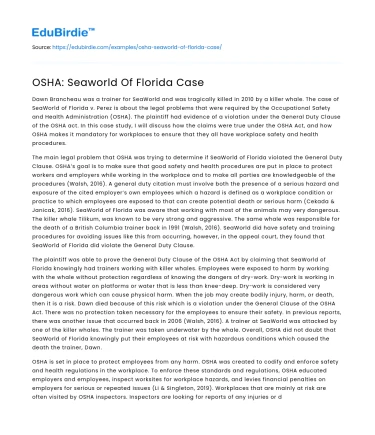Dawn Brancheau was a trainer for SeaWorld and was tragically killed in 2010 by a killer whale. The case of SeaWorld of Florida v. Perez is about the legal problems that were required by the Occupational Safety and Health Administration (OSHA). The plaintiff had evidence of a violation under the General Duty Clause of the OSHA act. In this case study, I will discuss how the claims were true under the OSHA Act, and how OSHA makes it mandatory for workplaces to ensure that they all have workplace safety and health procedures.
The main legal problem that OSHA was trying to determine if SeaWorld of Florida violated the General Duty Clause. OSHA’s goal is to make sure that good safety and health procedures are put in place to protect workers and employers while working in the workplace and to make all parties are knowledgeable of the procedures (Walsh, 2016). A general duty citation must involve both the presence of a serious hazard and exposure of the cited employer’s own employees which a hazard is defined as a workplace condition or practice to which employees are exposed to that can create potential death or serious harm (Cekada & Janicak, 2016). SeaWorld of Florida was aware that working with most of the animals may very dangerous. The killer whale Tilikum, was known to be very strong and aggressive. The same whale was responsible for the death of a British Columbia trainer back in 1991 (Walsh, 2016). SeaWorld did have safety and training procedures for avoiding issues like this from occurring, however, in the appeal court, they found that SeaWorld of Florida did violate the General Duty Clause.
Save your time!
We can take care of your essay
- Proper editing and formatting
- Free revision, title page, and bibliography
- Flexible prices and money-back guarantee
The plaintiff was able to prove the General Duty Clause of the OSHA Act by claiming that SeaWorld of Florida knowingly had trainers working with killer whales. Employees were exposed to harm by working with the whale without protection regardless of knowing the dangers of dry-work. Dry-work is working in areas without water on platforms or water that is less than knee-deep. Dry-work is considered very dangerous work which can cause physical harm. When the job may create bodily injury, harm, or death, then it is a risk. Dawn died because of this risk which is a violation under the General Clause of the OSHA Act. There was no protection taken necessary for the employees to ensure their safety. In previous reports, there was another issue that occurred back in 2006 (Walsh, 2016). A trainer at SeaWorld was attacked by one of the killer whales. The trainer was taken underwater by the whale. Overall, OSHA did not doubt that SeaWorld of Florida knowingly put their employees at risk with hazardous conditions which caused the death the trainer, Dawn.
OSHA is set in place to protect employees from any harm. OSHA was created to codify and enforce safety and health regulations in the workplace. To enforce these standards and regulations, OSHA educated employers and employees, inspect worksites for workplace hazards, and levies financial penalties on employers for serious or repeated issues (Li & Singleton, 2019). Workplaces that are mainly at risk are often visited by OSHA inspectors. Inspectors are looking for reports of any injuries or deaths that occur. They also observe the work property to ensure that everything is safe by taking notes on what needs to be repaired and what areas don’t meet the General Duty Clause.
I enjoy going to places like SeaWorld, however, I believe that animals are best in their own natural habitats or something really like it. SeaWorld was negligent and I believe they should have done more to protect their employees from any type of harm. Using a safer dry-work area where there a wall separating both the animal and the trainer may work better. Killer whales are in general aggressive hint the word “killer” should not even be close contact with humans. I believe there should always be emergency professionals available on-site during these performances just in case an employee need help.
References
- Cekeada, T. & Janicak, C. (2016). OSHA’s Enforcement of Forklift Standards & the Role of the General Duty Clause. Journal of Safety, Health & Environment Research Vol. 12, No. 1. Retrieved August 17, 2019 from http://go.galegroup.libraryresources.columbiasouthern.edu/psi/ADEOL/?sw=w&u=oran951837&v-2.1&it=r&id=GALE%CA1264785950
- Li, L. & Singleton, P. (May 2019). The Effect of Workplace Inspections on Worker Safety. ILR Review May2019, Vol. 72 Issue 3, p718-748. Retrieved August 17, 2019 from http://Go.galegroup.libraryresources.columbiasouthern.edu/psi/ADEOL/?sw=w&u=oran956285&v-4.2&it=GALE%CA284951
- Walsh, D. J. (2016). Employment law for human resource practice (5th ed). Boston, MA: Cengage Learning






 Stuck on your essay?
Stuck on your essay?

